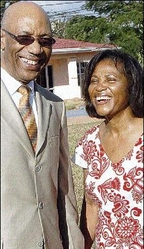 Governor General-designate Dr Patrick Allen and his wife, Patricia. Allen's appointment stirred much debate because of his Seventh-day Adventist affiliation. - Norman Grindley/Chief Photographer
Governor General-designate Dr Patrick Allen and his wife, Patricia. Allen's appointment stirred much debate because of his Seventh-day Adventist affiliation. - Norman Grindley/Chief Photographer
Put an Adventist in a room and immediately the jokes start. There are snickers that they don't eat pork, just the gravy, and that it's crazy that they go 24 hours on the Sabbath without watching HBO or Cinemax? And don't forget the usual jabs about whether Adventists should, or do, have sex on the Sabbath. Ahem.
Adventists, like many religious groups, have doctrinal idiosyncrasies that make them the butt of jokes - Hirsute Rastafarians are facetiously threatened with a haircut; tongues-talking Pentecostals - who occasionally erupt with holy-roller passion - are reputedly the most agile and fit; Catholics' softer line on alcohol and tobacco is viewed as giving them the best of both worlds; and Jehovah's Witnesses would put blood banks across the planet out of business.
When the fun factor kicks in, the line between fact and fiction is often smokescreened by rib-tickling humour. Just in case you're not absolutely sure about what Adventists believe, here is a quick rundown on the real deal.
That the Bible is the written word of God.
There is one God, in a Trinitarian form - Father, Son and Holy Spirit.
Humanity is involved in a 'great controversy', a moral and spiritual battle, between Christ and Satan regarding the character of God, His law and His sovereignty over the universe.
Jesus Christ is the only means of atonement or salvation from sin.
In the 'last days', during a time of widespread apostasy, a remnant - called out to keep the commandments of God - announces the arrival of the judgment hour and heralds the approach of His second advent. Proclamation is symbolised by the three angels of Revelation 14.
They believe in full-immersion baptism, as well as sacraments such as communion and foot washing.
Adventists consider prophecy as a defining characteristic of that denomination, reputedly manifested in one of its pioneers, Ellen G. White.
They hold that the Ten Commandments must be observed, including the controversial Sabbath, during which there should be no work unless in emergency or health-related circumstances. The Sabbath starts at sunset Friday and ends at sunset Saturday.
Like many denominations, it advocates a monthly payment of a tithe, 10 per cent from all income, to the church.
The movement has a rigorous health philosophy, promoting exercise and healthy diet. Condemns the use of what it terms unclean foods, such as pork and most seafood, (with the exception of fish) such as conch, shrimp, lobster and oysters; prohibits consumption of alcohol, tobacco, narcotic and mind-altering drugs , including caffeine.
The church believes that in 1844, at the end of the prophetic period of 2,300 days, Jesus entered the last phase of His atoning ministry. There is the doctrine of investigative judgement, during which genuine Christians who have died will be revealed; also highlights authentic Christians who are alive.
Jesus' 'Second Coming' will be visible worldwide, not in a mystical rapture as believed by many Protestant churches. The resurrection of the unrighteous will take place a 1,000 years later. Between both resurrections, Christ and His saints will rule in heaven. During the millennium, the unrighteous dead will be judged, and Satan and his angels will rule the Earth, devoid of humans. There will later be a grand conflict, universally referred to as Armaggedon, between Christ and His saints, and the devil. Thereafter, a new peaceful Earth will emerge.

















